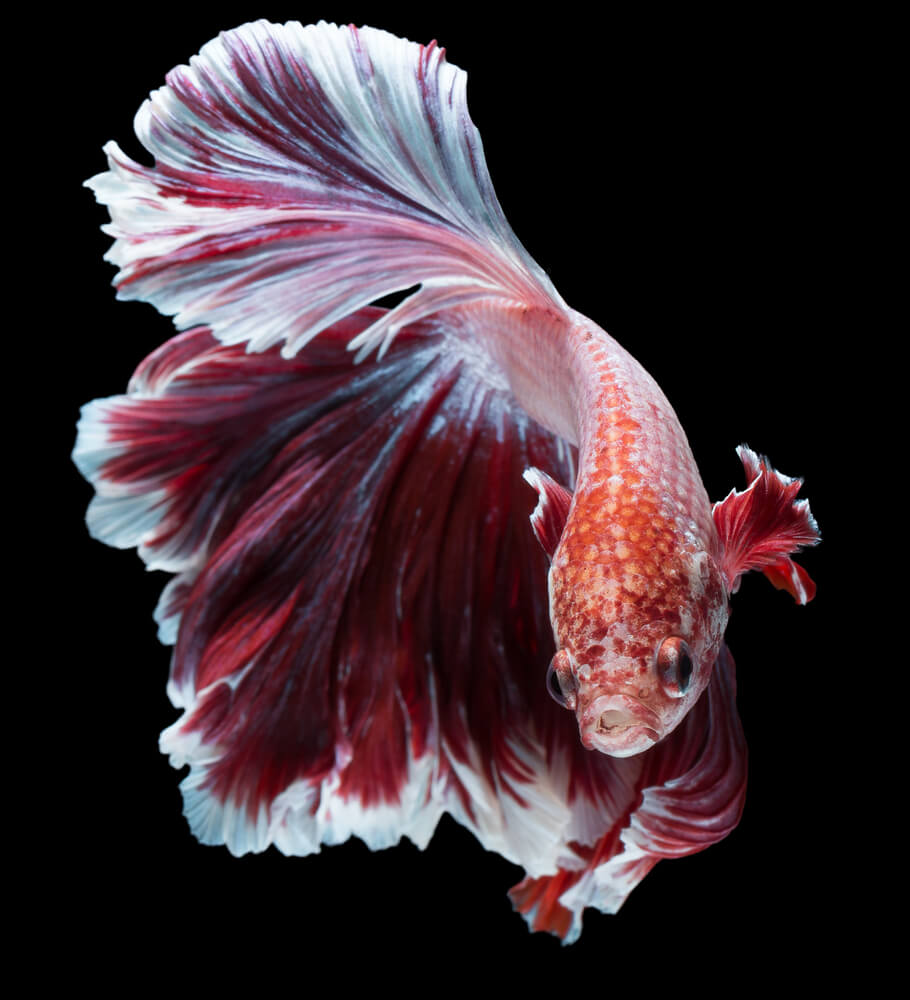Betta fish are beautiful and rewarding pets, but they do come with their own set of responsibilities. One of those is understanding what to expect when it comes to betta fish poop. Knowing how often your betta will go, how much waste their digestive system produces, and even what color the poop should be can help you keep your pet happy and healthy for years to come!
In this article we’ll explore all the facts about betta fish poop that every owner needs to know. Not only is knowing these details important in keeping your beloved betta safe, it’s also incredibly helpful if you’re looking into breeding them as well.
So let’s dive right in and get educated on this fascinating topic together!
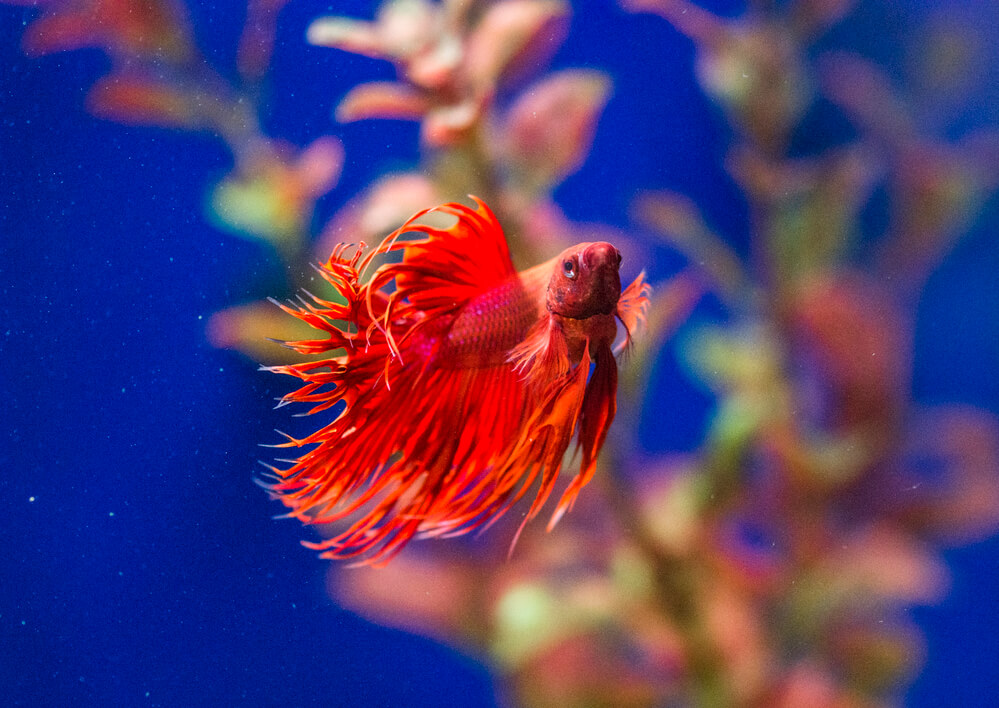
How Often Do Betta Fish Poop?
It’s no secret that betta fish produce waste, but how often do they actually poop?
The answer to this question varies depending on the type of diet your betta is consuming.
To put it simply, a healthy betta fish should be pooping at least once a day – and maybe even more in some cases.
Like any other living creature, the amount of food a betta consumes directly affects its digestive system and thus, their bowel movements.
If fed an excessive amount of food or given one large meal each day instead of smaller meals spread out throughout the day, your betta may have fewer bowel movements than normal.
On the flip side, if you give them too little food then they won’t have enough nutrition to sustain regular digestion.
It’s all about finding that sweet spot!
Therefore, keep an eye on what you feed your betta as well as how much you’re feeding them so that they can maintain a healthy balance between eating and pooping – both are essential for keeping your fish happy and healthy!
What Does Betta Fish Poop Look Like?
Betta fish poop is usually dark in color, and it tends to float on the surface of the water. Depending on what a betta has been eating, it can also be greenish or brownish-green colored. Additionally, if your betta isn’t getting enough food, their poop will become very thin and stringy like.
Most often you’ll see a single pellet of poop that’s about 1/8 inch long but sometimes they may produce more than one at once. Betta fish typically release several pieces throughout the day which is completely normal so don’t worry if you’ve noticed extra bits floating around!
It’s important to keep an eye out for any changes in your betta’s poop because this could indicate health problems such as parasites or other illnesses. If you spot anything unusual then make sure to contact your vet right away and get them checked out as soon as possible.
What Are The Causes Of Poor Poop Quality?
The quality of a betta fish’s poop is often an indicator of its overall health. But, what are the causes behind poor poop quality? It can be confusing to figure out why your betta looks and acts healthy but still produces foul-smelling droppings. Here’s what you need to know:
- Undigested food in the tank
- Parasites or bacteria that have infected the fish
- Dietary imbalances leading to inadequate nutrient absorption
To start off with one of the most common culprits – undigested food. If there’s too much of it in the tank, it can lead to excess waste being produced by your fish. This can result in unappetizing poops, as well as other issues like water contamination and increased ammonia levels.
If this happens, make sure to reduce the amount of food you’re giving your betta and perform regular maintenance on their tanks to keep them clean and free from any leftover bits of food!
Parasites or bacteria may also be responsible for discolored and smelly stools if they’ve managed to infect your fish. Many parasites require treatment with medication while others may respond better to dietary adjustments such as supplementing with probiotics or vitamins. In some cases, both methods will produce results so look into different options before deciding which route is best for you and your pet.
Finally, dietary imbalances caused by improper nutrition could also be at fault when it comes to unhealthy stool production. Make sure that all ingredients used in preparing meals are fresh and appropriate for bettas – otherwise, they won’t get all the nutrients needed for proper digestion which leads directly to poor digestive output!
Try switching up their diet every few weeks or months so that they don’t become accustomed to eating only one type of meal – variety is key here when trying to avoid nutritional deficiencies.
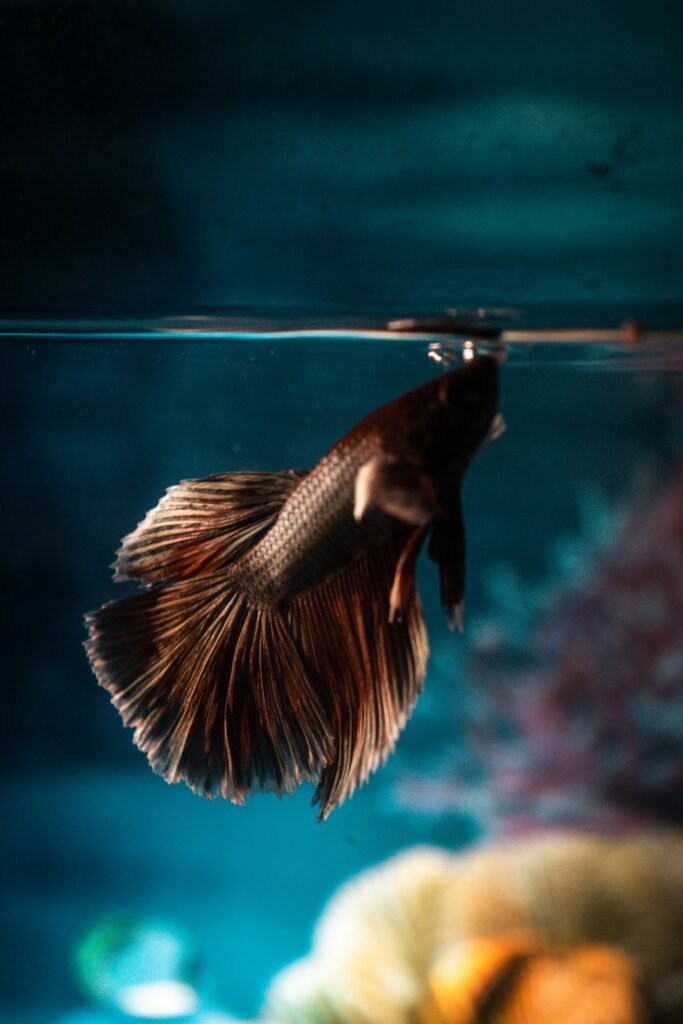
What Nutrients Do Betta Fish Need?
Protein is essential for betta fish as it helps in building and maintaining healthy muscles.
Fats and Omega-3s are also important for their overall health and well-being.
Vitamins and minerals are essential for their growth and development, while carbohydrates provide them with energy.
Calcium, magnesium, iron, phosphorus, potassium, sodium, chlorine, copper, and zinc are also important trace elements for betta fish.
Finally, a good diet for betta fish should also include plenty of omega-3 fatty acids.
Protein
Protein is an essential nutrient for betta fish, as it helps them to build and maintain their muscles. It’s important that you provide your pet with a high-quality diet containing enough protein, or else they won’t be able to grow and stay healthy. A good source of protein for bettas are live foods such as bloodworms, daphnia, brine shrimp, etc., but you can also feed them other types of food like flakes or pellets specifically designed for bettas.
It’s also important to remember not to overfeed your fish; this could lead to excessive waste in the tank which can cause water quality issues if left unchecked! Additionally, uneaten food will decompose quickly and create harmful ammonia levels in the water. So only give your betta what he needs – no more than two small meals per day is ideal.
To further ensure that your fish receives all the nutrients it requires, supplementing its diet with vitamin supplements is highly recommended. This way you’ll know that your beloved pet isn’t missing out on any vital vitamins or minerals needed for optimal growth and health!
Fats
Now that we have discussed the importance of protein for betta fish, let’s move on to fats.
Fats are another essential nutrient for these little guys and can be found in many different types of food.
You’ll want to look for foods containing higher amounts of healthy fats like Omega-3 fatty acids which help promote overall health and well-being.
These fats are also important as they provide energy and aid in digestion.
Not only that, but they also play a role in maintaining the immune system and keeping your pet’s coat looking shiny!
Just make sure you don’t overfeed your betta with high-fat foods, as this could lead to an unhealthy build up of fat deposits.
It is worth noting, however, that there are some benefits associated with feeding your betta small amounts of certain types of vegetable oils such as olive or coconut oil – just make sure not to go overboard here since too much fat can be bad for their health!
Finally, it’s always best to consult with your vet before making any changes to your pet’s diet so you know exactly what type and amount of food is right for them.
Vitamins
Now that we’ve talked about the importance of fats for betta fish, let’s move on to vitamins.
Vitamins are an essential part of any healthy diet and this holds true for your pet too.
It’s important to make sure they’re getting all the necessary vitamins from their food or through dietary supplements so that they can stay in optimal health.
Vitamin A is especially important as it helps with vision, skin health, and immunity; while vitamin C boosts immune system function and keeps their scales strong and resilient.
Even B-complex vitamins have a role to play in maintaining good kidney functioning and providing energy throughout the day.
So be sure to include these vital nutrients when planning out your betta’s meals!
Just remember not to go overboard though – like with anything else, it’s best to consult with your vet before making major changes to their diet.
That way you can ensure they get just the right amount of each nutrient every day.
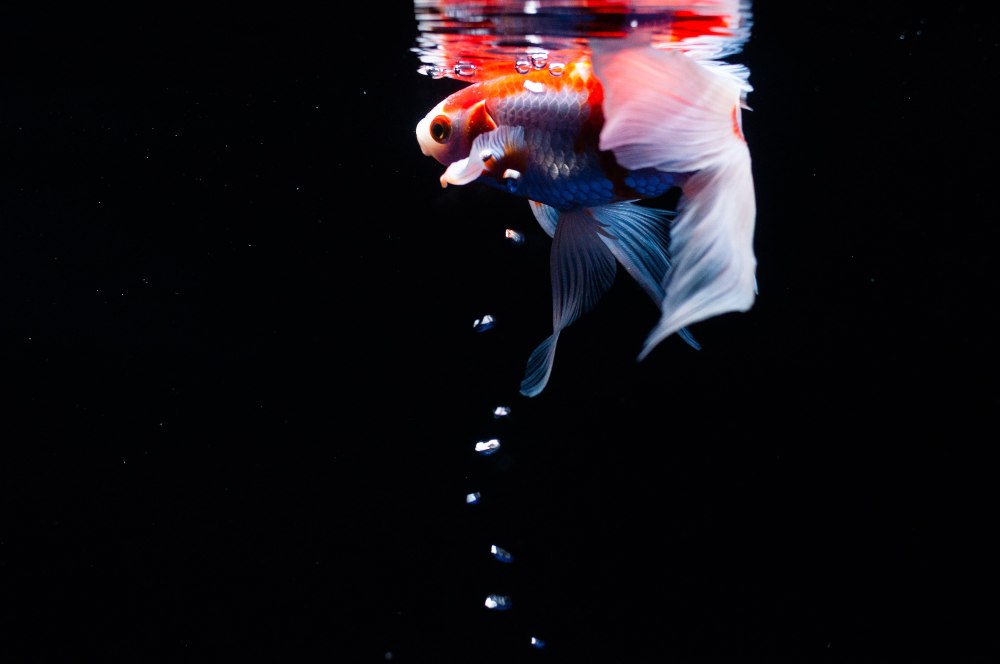
How Can I Prevent Betta Fish Poop Issues?
Keeping your betta fish healthy and preventing any unwanted issues with their waste is possible by following the proper guidelines.
Start by keeping the tank clean, which means you should do a full water change every two weeks. This will help reduce the amount of ammonia and other toxins that can build up in the water over time. During this process, be sure to use an aquarium vacuum or siphon to remove excess food, feces, and debris from the substrate.
In addition to regular cleaning, it’s important to monitor what type of foods you’re giving your betta fish. Feeding them too much processed food or treats can lead to constipation and unhealthy levels of poop in the tank. So try to stick with high-quality pellets designed specifically for bettas as well as fresh fruits and vegetables like zucchini slices or blanched peas.
Also remember to only give them small amounts of food at each feeding so they don’t overeat or develop digestive problems later on. To keep things even more under control, consider adding a filter system into your betta tank setup.
A good filter will help keep the water crystal clear while also removing those pesky bits of waste before they get out of hand. Plus, if you have live plants in your tank then having a filter running will ensure that all those beneficial bacteria are kept alive and thriving!
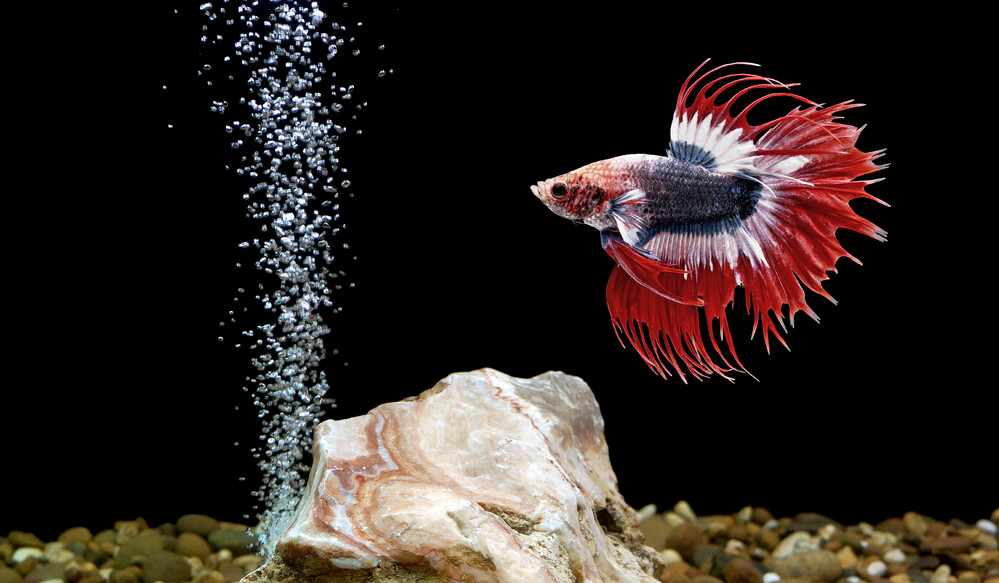
How Can I Tell If My Betta Fish Is Sick?
It’s important to recognize the signs that your betta fish might not be feeling well, as it can indicate a number of illnesses and health issues. But how do you tell if something is wrong? Well, there are several indicators to look out for.
First, observe your betta’s behavior; they should generally appear alert and active when viewed from above the tank but will usually become more shy or inactive when noticed. If they’re sluggish or unresponsive, this could point towards an underlying issue such as disease or improper water temperature.
Additionally, check their fins – if they seem clamped down or have any fraying edges then this is also cause for concern.
Lastly, inspect their coloration; healthy bettas typically display vibrant colors whereas unhealthy ones may show signs of fading or discoloration in certain areas.
In short, being aware of potential warning signs like these can help you identify whether there’s an issue with your betta before it becomes too severe and requires medical attention. Regularly monitoring them closely and keeping up with maintenance on their living environment will go a long way in promoting good health and preventing illness in the future.
What Are The Signs Of A Healthy Betta Fish?
A healthy betta fish should have vibrant colors, a good appetite and fins that are not tattered or torn. Keeping an eye out for these signs will help you determine if your betta fish is in the best of health.
Your betta fish’s coloration can tell you a lot about its overall health. If it has bright coloring, including blues, reds and yellows, then this usually means it is happy and healthy. But if their color starts to become duller than normal and they begin to lose their luster, this could be a sign of illness or stress. It’s important to take note of any changes in your betta fish’s coloring.
When looking at a healthy betta fish you should also notice that they have plenty of energy and swim actively around the tank. They should also have perky fins (not clamped against their body) that look smooth with no tears or rips present on them.
A good appetite is another sign that your betta fish is feeling great; if he’s eating normally but still looks skinny then there might be something wrong with him so check him over carefully for parasites or other illnesses.
Overall, a healthy betta fish should show all the signs discussed above; from vibrant coloring to active swimming and fin perking as well as having a hearty appetite. Keep an eye out for any changes in behavior or appearance – even small ones – which may indicate something more serious happening inside his little world.
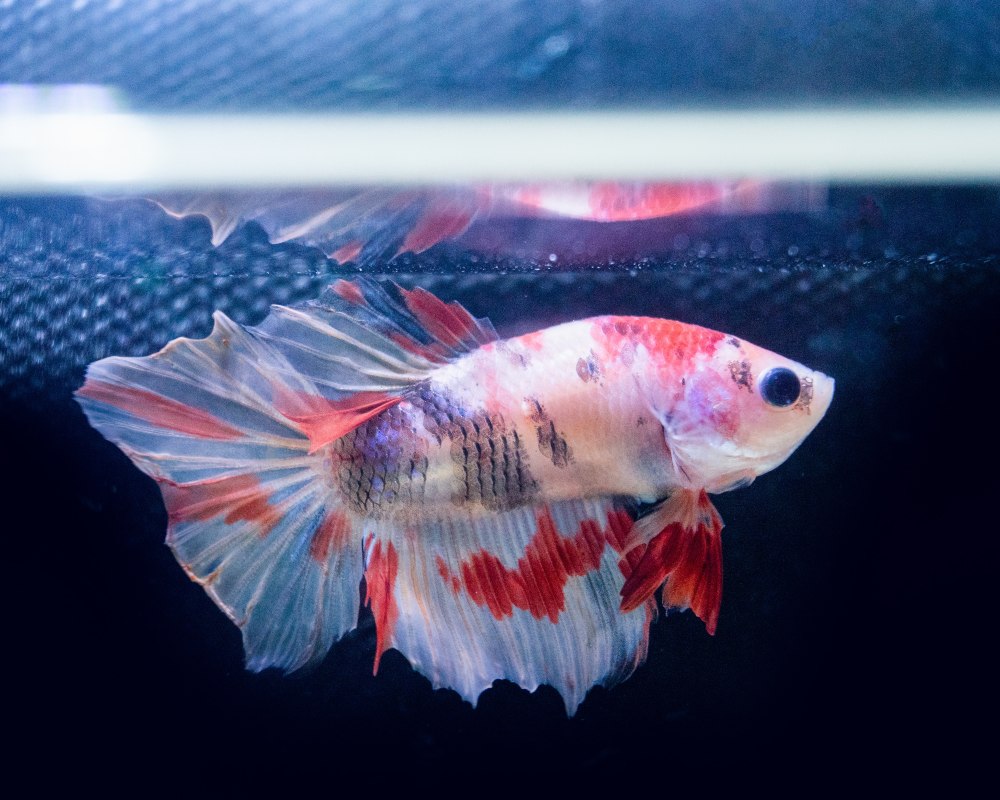
What Should I Do if My Betta Fish is Not Pooping?
It’s a peculiar situation, isn’t it? You have this gorgeous betta fish in your home and you’re so excited to care for them – but then something goes wrong. Your beloved pet is having trouble pooping! It can be an unsettling experience when your fish doesn’t seem healthy, and not being able to poop is definitely a sign that they aren’t well.
Fortunately, there are some things you can do to help get your betta back on track.
First of all, make sure their diet is balanced with the right amount of protein and fiber.
Feeding them small meals throughout the day can also help stimulate digestion and ensure regular bowel movements.
Additionally, making sure their water is clean and free from contaminants will allow them to process food more efficiently.
If these steps don’t help, try adding supplements like garlic or probiotics into their diet as these can aid digestion and promote regularity.
And if none of these remedies work after a few days, you should consider taking your little buddy to the vet for further evaluation – just to be safe!
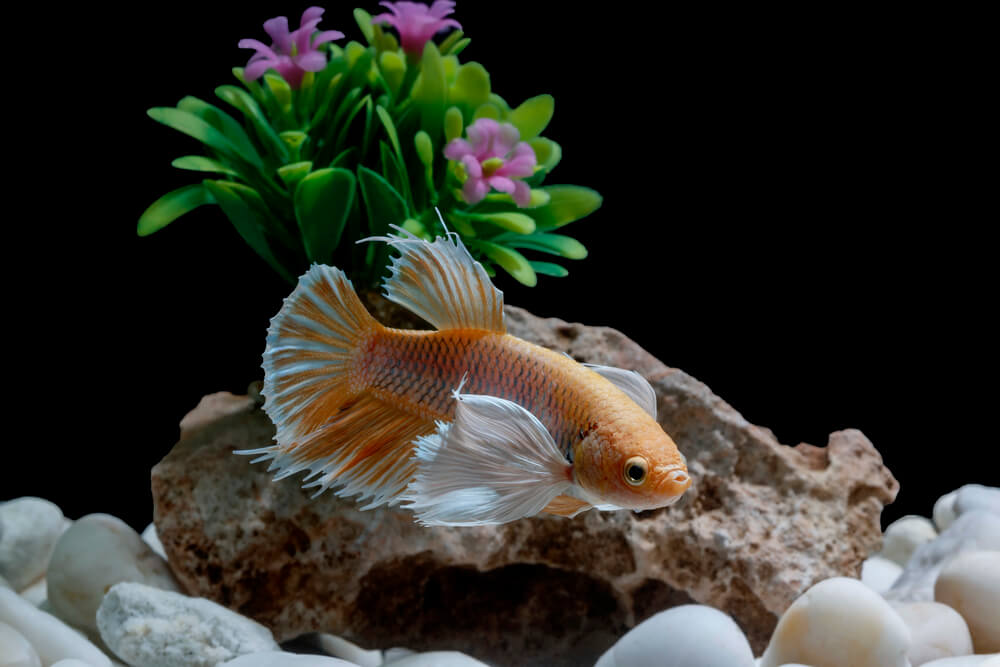
Conclusion
In conclusion, betta fish are one of the most popular pets and their poop can tell us a lot about their overall health.
It’s important to understand the frequency of pooping, what it looks like, how to prevent issues, and how to tell if they’re sick.
On average, healthy betta fish will produce between 2-6 pellets of poop per day depending on diet.
Knowing this information as well as other facts and signs of good health can help ensure that your pet is happy and healthy for years to come!

